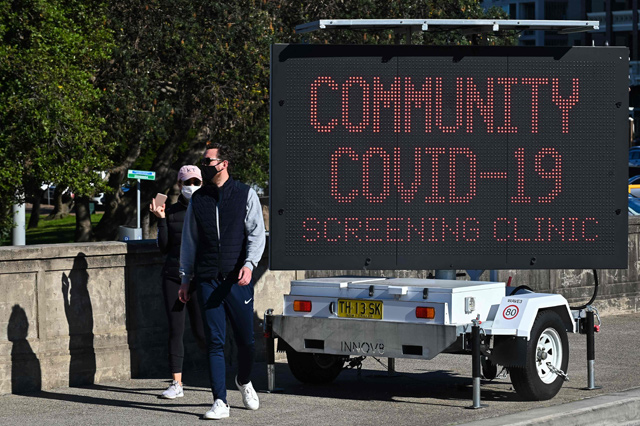MOSCOW — Moscow on Sunday recorded the worst daily coronavirus death toll so far for a Russian city, as countries across the Asia-Pacific region extended or reimposed restrictions to tackle fresh waves of infections.
The pandemic has now killed close to four million people across the world but vaccination drives have brought down infection numbers in many wealthy countries, though the Delta strain of the virus remains a concern.
The variant is now in 85 countries and is the most contagious of any COVID-19 strain identified, according to the World Health Organisation.
Still, in much of Europe and the United States curbs on daily life are easing as vaccination programmes bear fruit, although Russia is grappling with a deadly third wave.
The Russian capital on Sunday recorded 144 COVID-19 deaths in the last 24 hours, a day after Saint Petersburg set the previous highest figure.
Saint Petersburg has hosted six Euro 2020 matches and is due to host a quarter-final on Friday, with spectator numbers capped at half but still upwards of 26,000 people.
Russia as a whole has seen an explosion of new infections since mid-June driven by the Delta variant.
The dramatic rise in cases comes as officials in Moscow are pushing vaccine-sceptical Russians to get inoculated after lifting most anti-virus restrictions late last year.
“To stop the pandemic, one thing is needed: Rapid, large-scale vaccinations. Nobody has invented any other solution,” Moscow mayor Sergei Sobyanin told state-run television on Saturday.
‘Up in smoke’
The Delta variant is also feeding fresh outbreaks in southeast Asia and Australia where authorities have brought back or prolonged restrictions.
More than five million Sydney residents endured their first full day of a two-week lockdown on Sunday to contain an outbreak of the strain.
Restaurants, bars and cafes were shuttered and stay-at-home orders were issued, leaving the city centre virtually deserted.
“Given how contagious this strain of the virus is, we do anticipate that in the next few days case numbers are likely to increase even beyond what we have seen today,” New South Wales state Premier Gladys Berejiklian said.
More than 110 COVID-19 cases have been reported in Sydney since a driver for an international flight crew tested positive in mid-June for the Delta variant.
The flare-up has been a shock for a place that had returned to relative normality after months with few local cases.
Professional musician Blain Cunneen, 27, said his work, performing gigs, studio sessions and teaching students, had gone “up in smoke” overnight.
“All that was starting to operate again almost as normal... very suddenly overnight I got a bunch of emails and texts about everything being cancelled,” he told AFP.
Australia’s northern city of Darwin also entered a separate snap 48-hour lockdown on Sunday after a handful of cases were linked to a coronavirus outbreak on a remote gold mine.
“The Northern Territory is now facing its biggest threat since the COVID crisis began,” Northern Territory Chief Minister Michael Gunner said.
Restrictions reimposed
Similar spikes in infections have recently been seen across southeast Asia.
Thailand will from Monday reimpose restrictions on restaurants, construction sites and gatherings in the capital Bangkok as it tries to contain a wave of infections.
The country’s latest wave kicked off in April when a cluster was found in upscale Bangkok clubs.
Premier Prayut Chan-O-Cha has said he plans to fully reopen the country by October, but this would require hitting a target of vaccinating 50 million Thais in four months.
In neighbouring Malaysia, the prime minister announced that a nationwide lockdown in place for about a month already will continue, and he gave no date for the lifting of restrictions.
His government had previously said the strict curbs would be eased in stages, as long as there was a drop in infections, intensive care bed use and a rise in vaccination rates.
Bangladesh also said it would impose a new national lockdown from Monday, with offices shut for a week and only medical-related transport allowed.
